1900 Democratic National Convention
The 1900 Democratic National Convention was a United States presidential nominating convention that took place the week of July 4, 1900, at Convention Hall in Kansas City, Missouri.
| 1900 presidential election | |
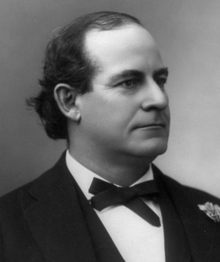  Nominees Bryan and Stevenson | |
| Convention | |
|---|---|
| Date(s) | July 4–6, 1900 |
| City | Kansas City, Missouri |
| Venue | Convention Hall |
| Candidates | |
| Presidential nominee | William J. Bryan of Nebraska |
| Vice presidential nominee | Adlai E. Stevenson of Illinois |
The convention nominated William Jennings Bryan for president and former Vice President Adlai E. Stevenson was nominated for vice president. The ticket was to lose the general election to the Republican ticket of William McKinley and Theodore Roosevelt.
Presidential nomination
Presidential candidate
Declined
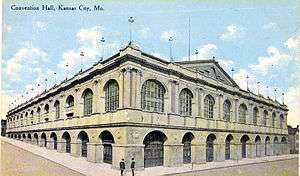
Bryan had little opposition for the nomination after Spanish–American War hero Admiral George Dewey dropped out in May after being quoted in newspapers that he thought the President's job would be easy, because the president merely followed the orders of Congress to enforce laws.[1] Bryan's strongest opposition at the convention came from Richard Croker of New York's Tammany Hall. Bryan was also nominated by a branch of the Populist Party.
The 1900 Democratic National Convention was the first time a woman served as a delegate to a major party convention. Elizabeth M. Cohen of Salt Lake City, Utah, became a delegate when one of the Utah delegates could not serve, and she seconded the nomination of William Jennings Bryan.[2][3][4]
The convention marked the first time that a member of royalty attended a U.S. national nominating convention as a delegate. David Kawananakoa, heir to the throne of the Kingdom of Hawaii, represented the newest United States territory. Prince David was to break a tie about inserting a free silver plank into the convention platform. The Democrats included planks in the platform denouncing Republican imperialism and expansion, as had been demonstrated in the Spanish–American War.
Kansas City had the convention thanks to its new Convention Hall, which opened on February 22, 1899. The hall was destroyed in a fire on April 4, 1900, but was rebuilt in 90 days in time for the convention. Harry S. Truman served as a page at the convention.
| Presidential ballot | |
| William Jennings Bryan | 936 |
Source: US President – D Convention. Our Campaigns. (March 10, 2011).

1st Presidential Ballot
Vice Presidential candidates
At the start of the convention, former Representative Charles A. Towne of Minnesota was considered the favorite for the vice presidential nomination, as both the Populists and the Silver Republican Party backed Towne.[5] Other names mentioned as possible candidates included former New York Senator David B. Hill, former New York Senator Edward Murphy Jr. and John W. Keller, New York City's Commissioner of Public Charities.[5][6]
Seven names were placed in nomination: Adlai Stevenson, David B. Hill, Charles A. Towne, Abraham W. Patrick, Julian S. Carr, John W. Smith, and J. Hamilton Lewis. Former Representative Lewis thanked the convention for its generosity but did not wish to be considered for the vice presidency. Governor Smith declined to allow the use of his name, and it was withdrawn before the result was announced. Former Senator Hill was opposed to including a pro-silver plank in the party platform, so he spoke against his own nomination and declared that he would not take it if offered. Former Vice President Stevenson won the nomination with the help of Bryanites who wanted to keep Hill off of the ticket.[7] The choice of Stevenson alienated the Populists and Silver Republicans, who had planned to nominate the Democratic ticket.[7]
Vice Presidential candidates
Declined
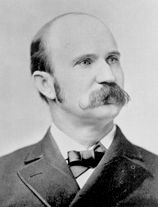 Former Senator David B. Hill of New York
Former Senator David B. Hill of New York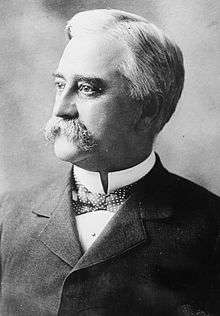 Governor John W. Smith of Maryland
Governor John W. Smith of Maryland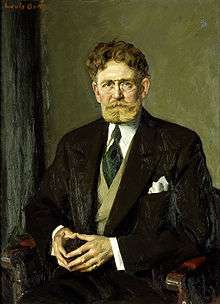
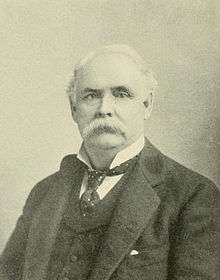 Former Senator Edward Murphy Jr. of New York
Former Senator Edward Murphy Jr. of New York
| Vice Presidential Ballot | ||||||||||||
| 1st Before Shifts | 1st After Shifts | |||||||||||
|---|---|---|---|---|---|---|---|---|---|---|---|---|
| Adlai E. Stevenson | 559.5 | 936 | ||||||||||
| David B. Hill | 200 | 0 | ||||||||||
| Charles A. Towne | 89.5 | 0 | ||||||||||
| Abraham W. Patrick | 46 | 0 | ||||||||||
| Julian S. Carr | 23 | 0 | ||||||||||
| John W. Smith | 16 | 0 | ||||||||||
| Elliott Danforth | 1 | 0 | ||||||||||
| Jim Hogg | 1 | 0 | ||||||||||

1st Vice Presidential Ballot Before Shifts 
1st Vice Presidential Ballot After Shifts
See also
- History of the United States Democratic Party
- List of Democratic National Conventions
- U.S. presidential nomination convention
- 1900 United States presidential election
- 1900 Republican National Convention
References
- "Archived copy". Archived from the original on 2012-10-18. Retrieved 2011-04-20.CS1 maint: archived copy as title (link)
- Smithsonian: Conventional Facts
- Official Proceedings of the Democratic National Convention (1900). McLellan Printing Co. 1900. pp. 91, 148, 267.
- Freeman, Jo (2000). A Room at a Time: How Women Entered Party Politics. Lanham, Maryland: Rowman & Littlefield Publishers. p. 65. ISBN 0-8476-9804-1. Retrieved May 20, 2013.
- "WJ Bryan to be Nominated Today". New York Times. 4 July 1900. Retrieved 8 October 2015.
- "Murphy Not a Candidate". Buffalo Morning Express. Buffalo, NY. June 28, 1900. p. 1 – via Newspapers.com.
- "Adlai E. Stevenson for Vice President". New York Times. 7 July 1900. Retrieved 8 October 2015.
External links
- Wind River history of convention
- Harpers Weekly Cartoon and History of Convention
- Democratic Party Platform of 1900 at The American Presidency Project
| Preceded by 1896 Chicago, Illinois |
Democratic National Conventions | Succeeded by 1904 St. Louis, Missouri |
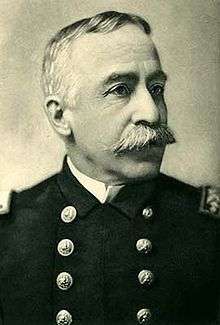
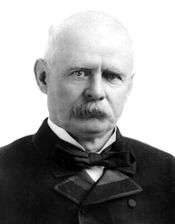
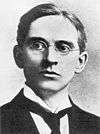

.jpg)